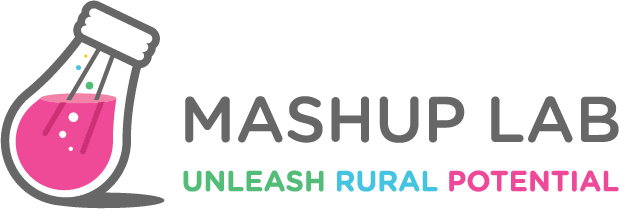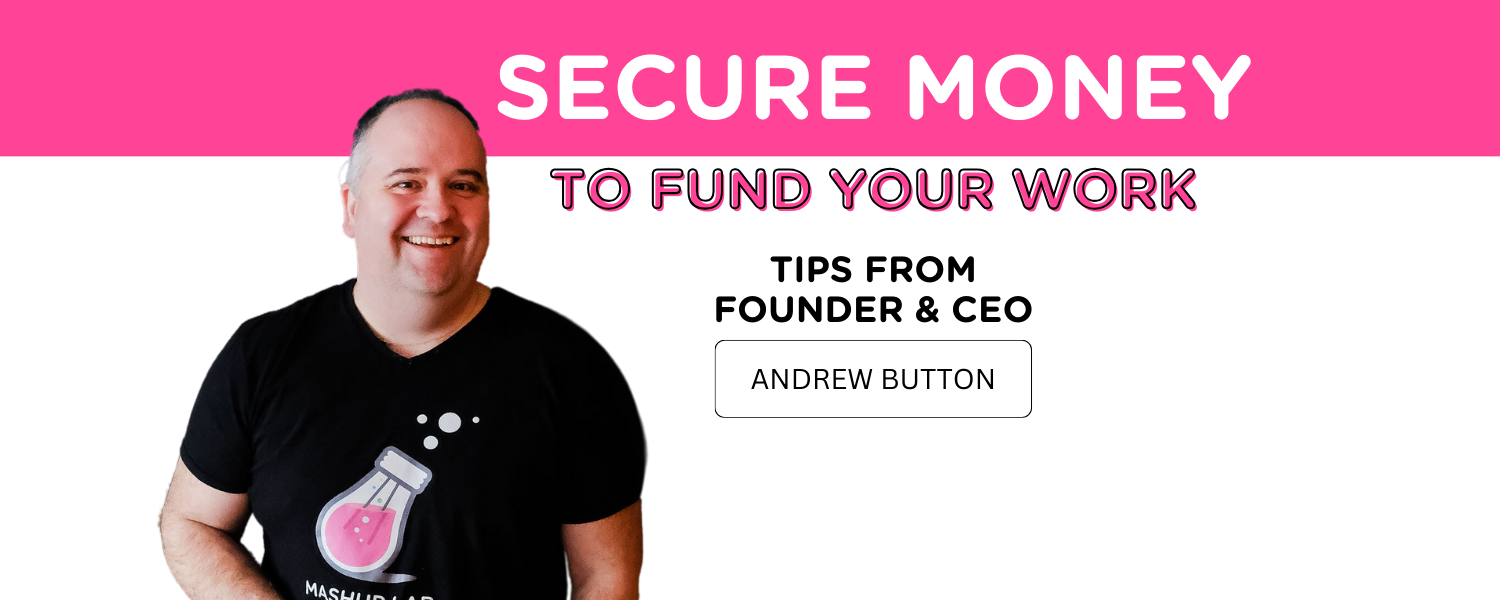If you have spent any time working in rural economic development or the rural entrepreneurial ecosystem, you know that one of the BIGGEST challenges in making innovative, purposeful things happen for your community is finding the money to make it happen.
We’ve seen this as a constant struggle as we’ve been expanding the delivery of our Mashup Lab Virtual Business Incubator (aka our Dream Business program) to rural regions in Canada and the US.
Most people know me as the Founder and CEO of Mashup Lab, but many folks don’t know that I spent over 15 years sitting in the same chair as many of the Community Champions we work with at Mashup Lab. In fact, the challenges I saw working in that space inspired me to launch Mashup Lab in the first place (more on that backstory here).
I experienced firsthand how difficult, time-consuming and frustrating it could be to find even small amounts of money to get a pilot project off the ground. I was often left with the same questions many of you may be struggling with right now:
- Why do they need all this seemingly useless information and detail?
- What exactly are they looking for from me?
- How the heck are they ever going to decide who gets this grant?
My last position was as Executive Director for a regional economic development agency responsible for a rural region comprising six municipalities representing approx. 50,000 people in Nova Scotia, Canada. Our core funding to cover the annual operating budget for the organization was $200,000; by the time I left, I had figured out how to leverage that $200,000 budget into $ 1.5 million in funding to do some pretty cool economic development and ecosystem-building projects in my community.
How did I do that, you ask? Two words: non-repayable contributions (aka “grants”).
I got pretty darn good at playing the grant writing game by the time I stopped being an employee in the economic development world and started my entrepreneurial journey with Mashup Lab.
What I noticed was that even though the purpose of a grant program may have been different (i.e. workforce development, technical support for business and entrepreneurs, economic diversification, experiential tourism initiatives, regional marketing, etc.), 90% of the information the funders were looking for was pretty much the same. I quickly figured out the common elements that made for a successful grant application or project proposal and put together a template that saved me a bunch of time.
I know how stretched you can get doing important economic development and entrepreneurial ecosystem-building work. I’m gifting you this editable grant proposal template for all your amazing work! It should save you time trying to figure the stuff out on your own and allow you to put your best foot forward on the next project you want to make happen in your rural community. Because I think you’re awesome!
Tips on Writing Winning Grant Proposals
So, with your new template in hand, here are some of the most important tips I learned over nearly two decades working in the rural economic development and entrepreneurial ecosystem world about writing a winning grant proposal.
1. Get to know the people who care the most about the community you’re looking to serve.
Whether that is a geographic community OR a defined community of people, and regardless of the purpose of the initiative you’re trying to get off the ground, get to know the people (ideally right in your backyard) that care the most about trying to solve the same problem you’re trying to solve.
While it may be tempting to go after the ‘marquee’ foundations and government departments with the deepest pockets, you’ll likely have more success approaching people and organizations that may not be as well funded but care just as deeply about seeing the impact in your community as you do.
The big players get approached by dozens (perhaps even hundreds!!) of organizations with their hands out, and they see thousands of applications; it is going to take a lot of work to differentiate yourself and make your project stand out.
‘The riches are in the niches’. Turns out the same principle applies to entrepreneurship as well. Every community is different, but your local Community Foundation might be a great place to start; if you are in Canada, you can find a Community Foundation near you here. For my rural friends south of the border in the US, click here.
2. Go small, and get as local as you can get with your ask.
I’ve found that strategy to be ten times more effective. Besides, if you are a rural person, you likely know how to make a little bit of money go a really, really long way. It’s in our DNA.
3. Fund your “MVP” before you go for the big ask.
We share a concept with all the entrepreneurs going through our Virtual Business Incubator called Minimum Viable Product or “MVP.” Essentially, it is just a fancy term for a test. If you’ve never heard of it, google it, and you’ll find lots of cool stuff.
The strategy is dead simple:
- Look for smaller pots of money to pilot whatever it is you want to do.
- Test the concept.
- Modify the project based on the feedback from your test.
- Test it again.
- Use the results (aka proof) to make a bigger ask to roll the project out in a bigger way.
Interesting Tidbit: The fact that Mashup Lab has delivered our Virtual Business Incubator in dozens of rural communities throughout Canada and the US and has a proven track record of delivering results often gives the Community Champions we partner with in other rural places the data and proof they need to skip over this “MVP” step and get right to have a more comprehensive, broader impact in their community.
We’d love you to Book a Discovery Call (no obligation, of course) if you think this could give you a bit of a head start when activating untapped entrepreneurial talent in your community and accelerating your economic development efforts.
4. Funders don’t want another mouth to feed forever.
The money won’t keep coming forever. At some point, you will run out of grants to apply for to keep your project going.
5. Have an answer for how you plan to sustain the work after the project funding runs out.
Looking for funding to bring our Virtual Business Incubator to your community? Download the Mashup Lab Grant Proposal Template to save yourself time and help you build a stronger case for your grant proposal.
Keep doing the important work you do! You Rock!

